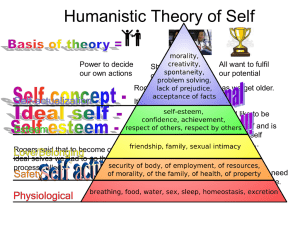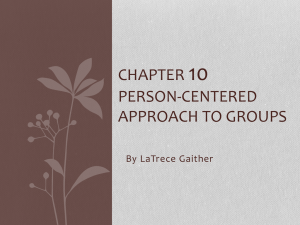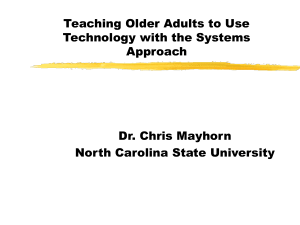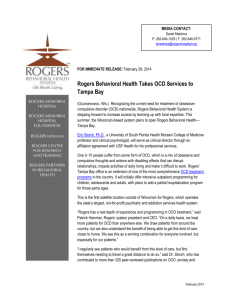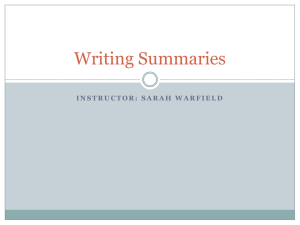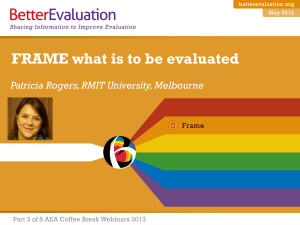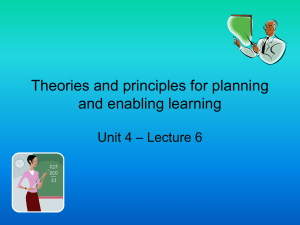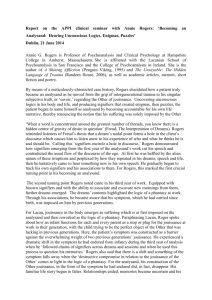Document 5444595
advertisement
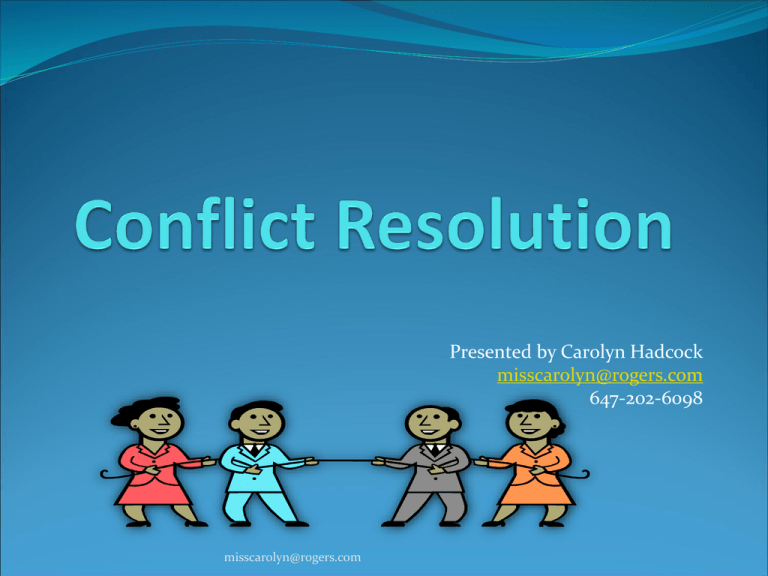
Presented by Carolyn Hadcock misscarolyn@rogers.com 647-202-6098 misscarolyn@rogers.com Conflict Draw what conflict looks like or feels like to you. What does conflict sound like??? What are the advantages of conflict?? What are the disadvantages of conflict?? misscarolyn@rogers.com Definition of Conflict Conflict is seen as a form of human interaction, usually between at least two persons or groups who are committed to traditions, goals, interests, or ideological positions that: Are perceived to be incompatible Prevents all or some participants from satisfying their basic needs Are accompanied by powerful emotions misscarolyn@rogers.com Conflict Myths Myth # 1 Conflict must be avoided at all costs. Myth # 2 Conflict always occurs because of a misunderstanding. Myth # 3 Conflict is always a sign of poor interpersonal relationships. Myth # 4 Conflict can always be resolved. Myth # 5 Conflict is always bad. misscarolyn@rogers.com Assertive vs. Aggressive Behaviour Assertiveness Aggressiveness Express your interests Expresses your interests without denying the rights of others Is other-oriented Describes what you want Discloses your needs, Using the “I” message. and denies the rights of others Is self-oriented Evaluates the other person Discloses your needs using “You” messages misscarolyn@rogers.com NON-ASSERTIVE, ASSERTIVE AND AGGRESSIVE BEHAVIOURS Non-Assertive Assertive Aggressive As the Deliverer As the Deliverer As the Deliverer Self denying Self-enhancing Self-enhancing at the expense of others Inhibited Expressive Over-expressive Does not achieve desired goals May achieve desired goals Achieves desired goals at expense of others Others choose Chooses for self Chooses for others Uncertain, anxious, self depreciative Confident, feels good about self Depreciates others misscarolyn@rogers.com Behaviours Con’t Non-Assertive Assertive Aggressive As the Receiver As the Receiver As the Receiver Impatient, guilty, or angry Knows where one stands Feels put down, depreciated No respect for deliverer Respects deliverer Hurt, defensive, humiliated Achieves desired goals at deliverers expense May achieve desired goals Does not achieve desired goals misscarolyn@rogers.com A*S*S*E*R*T YOURSELF A* Describe the action S* S* E* R* T* Express your subjective interpretation Express your sensations related to the action Indicate the effects of the action Make your request Tell your intentions misscarolyn@rogers.com How We Speak I didn’t say you stole that apple. I didn’t say you stole that apple. I didn’t say you stole that apple. I didn’t say you stole that apple. I didn’t say you stole that apple. I didn’t say you stole that apple. I didn’t say you stole that apple. misscarolyn@rogers.com Design an I Message You are at a staff meeting and one of your teachers tells you that a parent disclosed to her that you are a poor communicator, in front of all the other teachers. I feel ___________________ when you ____________ because _____________________ . And in the future I _________________________. Conflict Quiz misscarolyn@rogers.com Conflict Resolution Plan Ahead – Analyze Check Your Attitude Brush up on Your Listening Skills Separate the issue form your personal solution Set the Tone Create a Common Vision Discuss and Define the Problem\Summarize New Understandings Paraphrase Brainstorm Alternative Solutions Decide on the Most Appropriate Solution Plan for Follow-Up misscarolyn@rogers.com Managed Conflict Encourages open communication and cooperative problem solving Strengthens relationships and builds teamwork Quickly resolves disagreements and increases productivity Deals with real issues and concentrates on consensus resolution Airs all sides of an issue in a positive, supportive environment Is orderly, calm and focused Provides an environment conducive to negotiation misscarolyn@rogers.com Planning for a Successful Meeting Find the right moment: Look at NOW – don’t wait You need to look at schedules and find an appropriate time for all involved misscarolyn@rogers.com Planning for a Successful Meeting Being prepared take appropriate steps: *make a list of the issues * all parties should be informed of who is attending * set a time limit misscarolyn@rogers.com Planning for a Successful Meeting Prepare yourself make a list of the information you wish to discuss talk to anyone else that may be involved make observations if necessary i.e. concerns a child misscarolyn@rogers.com Planning for a Successful Meeting Using the Right Setting Adequate time; usually no more than 1 hour alotted Should be uninterrupted time Comfortable surroundings Arrange open-ended setting – sit is an open area instead of behind a desk misscarolyn@rogers.com Planning for a Successful Meeting Conducting the Meeting Ensure all parties feel welcome Everyone will be nervous, especially parents Plan your shared agenda ( if not able to do it before hand) Develop an exchange by listening attentively Be mindful of your own facial expressions Move through the topics on the agenda Avoiding generalities misscarolyn@rogers.com Planning for a Successful Meeting Take on the problem Be honest and direct Be constructive Be aware of any signs of emotions – acknowledge those emotions Accept all plans as possibilities Choose a plan of action End well Arrange for a follow up misscarolyn@rogers.com Changing Ourselves We can change the way we deal with difficult people and we can change the way we deal with difficult situations... We can give up behaviours that are unproductive and adopt behaviours that are more likely to lead to managing conflict productively. Changing unproductive behaviours we use in conflict situations will make us more effective in dealing with those situations. When we change ourselves and our conflict behaviours, we change from the inside out... Changing ourselves and how we deal with conflict does not mean giving up or giving in. It simply means changing from unproductive habitual patterns to behaviour that is more effective.... misscarolyn@rogers.com CASE STUDIES In a small group, choose an appropriate scenario to work through, using the guidelines given.... misscarolyn@rogers.com Thank you for attending Have a safe journey home!!!
